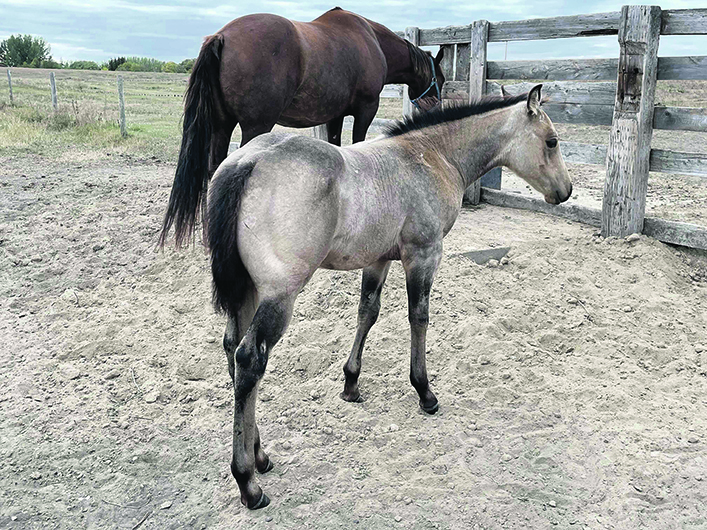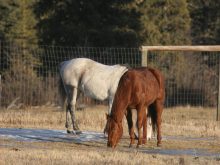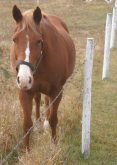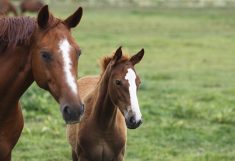SASKATOON — Equine reproduction specialist Dr. Claire Card has advice for horse owners caring for pregnant mares this winter.
Card, a professor with the Department of Large Animal Clinical Sciences at the University of Saskatchewan’s Western College of Veterinary Medicine, said horses in Western Canada tend to be on the heavy side.
“Keeping horses in good body condition throughout the year is important for healthy pregnancies,” she said.
Horses gestate for 11 months.
Card said on the body condition scoring system, horses in the West are often a fleshy seven out of nine. A score of nine is considered extremely fat. With additional pregnancy weight, an already-heavy mare is at higher risk of founder (also called laminitis).
Card said an overweight horse, with access to an overabundance of grass, round bales and concentrates, can lead to a foal with metabolic challenges down the road.
On the other end of the scale, if a pregnant mare is too thin, Card recommended getting her teeth examined and floated. The amount of sedation needed for a dental exam is not usually an issue for a pregnant mare.
Horse owners must also make sure mares have the right vaccines during gestation. The core vaccinations given to horses in Canada are against eastern-western encephalomyelitis, West Nile virus, rabies and tetanus. It is generally safe to vaccinate and deworm pregnant mares, she said.
Equine Herpes Virus 1 is usually considered a risk-based vaccine. However, if a pregnant mare is infected with EHV-1, the virus can cause the foal to abort. As well, if the mare is latently infected with EHV-1, pregnancy or environmental stress can cause the virus to reactivate.
EHV-1 can spread quickly at horse shows and in riding stables. For this reason, it is recommended that horse owners keep biosecurity top-of-mind. After the fifth month of pregnancy, the mare should have a stable social group with no contact with horses that move on and off the farm.
Iodine is an essential nutrient required to produce the thyroid hormones that play a key role in equine metabolism and growth. Pregnant mares need to consume iodine to prevent birth defects and congenital hypothyroidism dysmaturity syndrome.
Card led a multi-year study at the WCVM aimed at making sure that pregnant mares got adequate levels of iodine in their diets to prevent the negative effects of an iodine deficiency on their foals. Worst -case scenario is that an iodine deficiency leads to the foal being euthanized because of abnormalities.
Conventional wisdom is that livestock salt blocks provide horses with enough iodine. However, Card’s research found that horses don’t take enough out of salt blocks (particularly if the blocks are buried in snow). Livestock salt blocks were originally developed for cows, sheep and goats and were not tested todetermine whether they met horses’ needs.

Card said owners often must add iodine to supplement their horses’ diets because prairie soils are deficient in this nutrient. A better option than salt blocks is having loose salt with a high level of iodine in it available, adding it to the horses’ feed or mixing it into a palatable mineral supplement.
The studies also examined other factors that affect iodine absorption. This includes nitrates from fertilizer and glucosinolate, a compound found in wild mustard plants and cultivated oilseeds like mustard and canola. Nitrates can be found in dugout water, fertilized pastures and green feed (and act similarly to glucosinolates).
“Nitrate exposure is not great for pregnant horses. In terms of glucosinolates, proper pasture management and weed management are key, as nitrogen and compounds in the plants lower iodine uptake,” said Card.
She pointed out that pregnant mares, especially during late gestation, are highly susceptible to ergot poisoning from feed. Drought conditions can lead to higher levels in feed. Laboratories like Prairie Diagnostic Services in Saskatoon can provide a feed analysis report to horse owners if there is a concern.
After a healthy foal is born, latched on and bonded with its dam, the pair can be reintroduced to the herd. A stable herd with enough feed and space to prevent constant stress and fighting over equine dominance is ideal.







![Conservative agriculture critic and Alberta Foothills MP John Barlow said some [people who raise horses for the overseas meat market] were harassed and bullied and wanted no part of the study, even though they could lose their livelihood if the bill is passed. | File photo](https://static.producer.com/wp-content/uploads/2024/04/30150023/03-BJM121610horse-feedlot-235x165.jpg)







